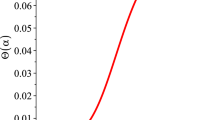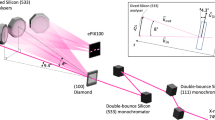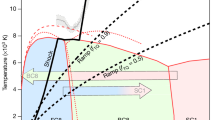Abstract
THE measurements of the thermal expansion of diamond made by Dembowska, which according to Grüneisen1 appeared to support his well-known formula connecting the specific heat and thermal expansion coefficient of simple solids, covered only a rather small range of temperature. A satisfactory test of the Grüneisen relationship appeared to require data over a wider range of temperature. I have accordingly measured the change in the lattice spacing of diamond with temperature over the range 25°–650° C.
This is a preview of subscription content, access via your institution
Access options
Subscribe to this journal
Receive 51 print issues and online access
$199.00 per year
only $3.90 per issue
Buy this article
- Purchase on Springer Link
- Instant access to full article PDF
Prices may be subject to local taxes which are calculated during checkout
Similar content being viewed by others
References
Grüneisen, "Handbuch der Physik", 10, 42 (1926).
Pitzer, J. Chem. Phys., 6, 68 (1938).
Magnus and Hodler, Ann. Phys., 80, 808 (1926).
Author information
Authors and Affiliations
Rights and permissions
About this article
Cite this article
KRISHNAN, R. Thermal Expansion of Diamond. Nature 154, 486–487 (1944). https://doi.org/10.1038/154486c0
Issue Date:
DOI: https://doi.org/10.1038/154486c0
This article is cited by
-
Thermal expansion, molar volume and specific heat of diamond from 0 to 3000k
Journal of Electronic Materials (1996)
Comments
By submitting a comment you agree to abide by our Terms and Community Guidelines. If you find something abusive or that does not comply with our terms or guidelines please flag it as inappropriate.



